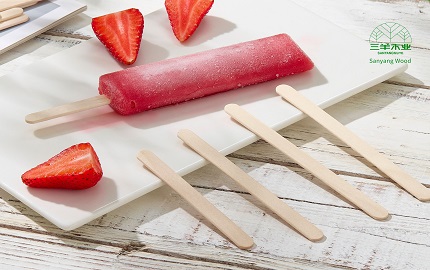

In an age where sustainability and consumer health are at the forefront of product decisions, wooden ice cream sticks stand out as an excellent choice for both manufacturers and consumers. These sticks, made from natural wood, offer a range of benefits that not only make them more environmentally friendly than plastic alternatives but also ensure safety for consumers. This article delves into the key factors that make wooden ice cream sticks an ideal choice, including their eco-friendliness, safety, and customer appeal.
Wooden ice cream sticks, a type of disposable wooden utensils, are primarily made from wood, which is a renewable resource. Through sustainable forestry practices, where trees are replanted after harvesting, the supply of wood can be maintained indefinitely. This helps in preserving natural ecosystems while ensuring a steady supply of raw materials for production. The use of wooden materials contrasts sharply with non-renewable resources like plastics, which rely heavily on petroleum and take a significant toll on the environment in terms of extraction and production.
The carbon footprint of wooden products, including ice cream sticks, is significantly lower compared to that of plastic. During the life cycle of wood, particularly as it grows, trees absorb carbon dioxide, which helps mitigate climate change. Additionally, the manufacturing process for wooden sticks requires less energy compared to the production of plastic alternatives, further reducing overall carbon emissions. This makes wooden ice cream sticks an ideal choice for companies looking to reduce their environmental impact.
One of the biggest challenges with plastic is its persistence in the environment; it can take hundreds of years to degrade, causing long-term pollution. In contrast, wooden ice cream sticks are naturally biodegradable. When discarded, they break down over time without releasing harmful chemicals into the environment. This helps in reducing the amount of waste that ends up in landfills or oceans, contributing to a cleaner and healthier planet.
The production of wooden ice cream sticks requires less energy than plastics, which go through energy-intensive chemical processes during their creation. The wood processing techniques used to create wooden sticks, like cutting and shaping, are relatively straightforward. Furthermore, wooden ice cream sticks can be recycled or composted easily, making them part of a more sustainable waste management cycle.

One of the major concerns with plastic packaging, including plastic ice cream sticks, is the potential leaching of harmful chemicals like BPA (Bisphenol A) or phthalates. These chemicals can migrate into food, especially when exposed to heat or prolonged storage. Wooden sticks, on the other hand, do not require such harmful chemicals during their manufacturing process, ensuring that they are non-toxic and pose no risk to human health.
Unlike some plastic alternatives, wooden ice cream sticks do not contain harmful additives like heavy metals, dyes, or synthetic coatings. This makes them ideal for direct contact with food, as there is no risk of consumers ingesting any hazardous substances. Moreover, wooden sticks provide an all-natural solution that aligns with the rising demand for clean and safe food packaging materials.
As a trusted and professional ice cream sticks manufacturer, our wooden ice cream sticks do not release any harmful gases or substances during use or disposal. Plastics, especially when burned or exposed to extreme heat, can release toxic fumes that contribute to air pollution and health problems. Wooden materials, being natural, do not pose this threat and can decompose naturally without polluting the air, soil, or water.
Wooden ice cream sticks are smooth and can easily be sterilized during the manufacturing process. They offer a natural barrier to bacterial growth, making them a hygienic option for food consumption. Their non-porous surface also ensures that they remain free from contaminants during use, further protecting the health and safety of consumers.
Consumers today are increasingly drawn to products that offer a natural and tactile experience. Wooden ice cream sticks, with their natural wood grain and warm texture, provide a pleasant tactile experience, unlike the cold and artificial feel of plastic. This can enhance the overall enjoyment of consuming an ice cream, adding to the product's sensory appeal.
For companies, the shift toward sustainable packaging materials like wooden ice cream sticks can improve brand image. As consumers become more environmentally aware, they tend to favor brands that demonstrate a commitment to sustainability. By adopting wooden ice cream sticks, companies can align their products with consumer values, thereby enhancing brand loyalty and market appeal.
Wooden sticks offer versatility when it comes to branding and customization. They can be laser-engraved or printed with company logos or designs, offering a subtle yet effective way for businesses to promote their brand in an eco-friendly way. This also contributes to the visual appeal of the product, further enhancing its marketability.
Some may raise concerns about the durability of wooden ice cream sticks compared to plastic ones. However, modern wood processing techniques have ensured that wooden sticks are just as durable, if not more so, than their plastic counterparts. With proper handling and treatment, wooden sticks can remain strong, flexible, and resistant to breaking.
As for cost, while wooden ice cream sticks may have a slightly higher upfront price than plastic, the long-term environmental and health benefits far outweigh the initial investment. Furthermore, as demand for sustainable products grows, economies of scale are likely to reduce the cost of wooden sticks further.
In conclusion, wooden ice cream sticks offer a range of environmental and health benefits that make them the superior choice for both businesses and consumers. From their renewable nature and low carbon footprint to their safety and aesthetic appeal, wooden sticks represent the future of sustainable packaging. As more companies and consumers prioritize eco-friendly materials, wooden ice cream sticks will likely become the standard in the industry, helping to reduce waste, protect the environment, and ensure consumer safety.